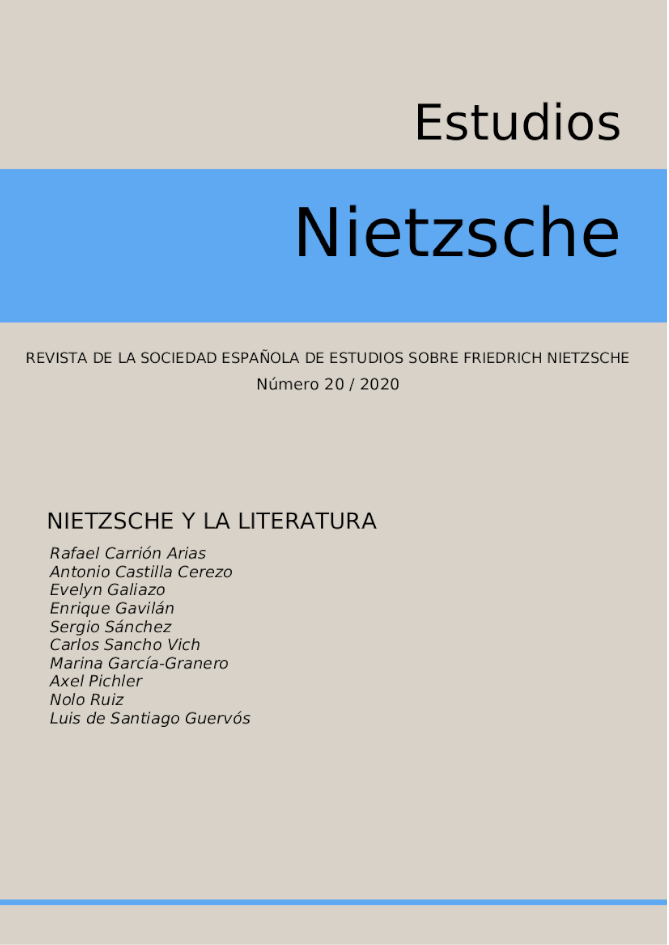Nietzsche as a historian of literature: a nodal watchtower for his thinking
DOI:
https://doi.org/10.24310/EstudiosNIETen.vi20.10896Keywords:
History of Greek literature, theory of literature, literary criticism, literary historiography, will to power, philosophy of historyAbstract
Nietzsche’s importance as a historian of literature is as considerable as it is unexpected, since in that task all his previous concerns converge in a nodal way, and long-term designs of his philosophy are announced. On the other hand, there is a notable lack of studies on the subject. The present article seeks to expose the role of Nietzsche’s literary historiography in the midpoint of his intellectual development as a high stop along the way from which to observe the direction of his thinking.
Downloads
Metrics
References
Bauer, G., «Vom Entzücken an gut gebauten Sätzen. Nietzsche als klassischer/unklassischer Philologe» en I. von der Lühe/A. Runge, Wechsel der Orte. Studien zum Wandel des literarischen Geschichtsbewusstseins, Göttingen, 1997, pp. 107-119.
Behler, E., «Das Problem des Anfangs in der modernen Literaturgeschichtsschreibung», en E. Behler, Studien zur Romantik und zur idealistischen Philosophie, Paderborn: Schöninghausen, vol. 1, 1991.
Benne, C., Nietzsche und die historisch-kritische Philologie. Berlin/New York: de Gruyter, 2005.
Borkowski, J./Heine, P. D., «Ziele der Literaturgeschichtsschreibung»: Journal of Literary Theory 7 (2013), 31-63.
Carrión Arias, R., «Nietzsche, la filología, y la filosofía: conjunciones en el horizonte de la crítica»: Logos. Anales del Seminario de Metafísica 53 (2020), 159-172.
Carrión Arias, R., Historia de la literatura griega: los orígenes del método genealógico en F. Nietzsche, New York: Peter Lang, 2020.
Gutzwiller, H., «Friedrich Nietzsches Lehrtätigkeit am Basler Paedagogium 1869-1876»: Basler Zeitschrift 50 (1951): 148-224.
Hillebrand (ed.), B., Nietzsche und die deutsche Literatur. 2 vols., München: dtv/Tübingen: Niemeyer, 1978.
Janz, C. P., «Friedrich Nietzsches Akademische Lehrtätigkeit in Basel 1869-1879»: Nietzsche-?Studien 3 (1974): 192-203.
Kunne-Ibsch, E., Die Stellung Nietzsches in der Entwicklung der modernen Literaturwissenschaft. Assen 1972; F.
Kittler, «Nietzsche (1844-1900)», en H. Turk (ed.), Klassiker der Literaturtheorie, München: C. H. Beck Verlag, 1979, pp. 191-205.
Luhmann, N., «Das Problem der Epochenbildung und die Evolutionstheorie» en H.U. Gumbrecht, U. Link-Heer (ed.), Epochenschwellen und Epochenstrukturen im Diskurs der Literatur- und Sprachhistorie, Frankfurt a. M.: Suhrkamp, 1985, pp. 11-33.
Mandelbaum, M., History, Man and Reason: A Study in Nineteenth-century Thought, Baltimore: Johns Hopkins Press, 1971.
Müller, E., Die Griechen im Denken Nietzsches, Berlin/New York: de Gruyter, 2005
Parsons, T., «Evolutionary Universal in Society» en T. Parsons, Sociological Theory and Modern Society, New York: Free Press, 1967.
Pfotenhauer, H. «Nietzsche Literaturkritik als Wille zur Macht oder die Kunst jenseits vom Guten und Schönen», en W. Haug/W. Barner, Ethische contra ästhetische Legitimation von Literatur. Akten des VII. Kongress der Internationalen Vereinigung für Germanische Sprache und Literaturwissenschaft (25-31 agosto, Göttingen 1985), Tübingen: Max Niemeyer Verlag, 1986, pp. 78-85.
Pfotenhauer, H., Die Kunst als Physiologie. Nietzsches ästhetische Theorie und literarische Produktion, Stuttgart: J. B. Metzlersche Verlagsbuchhandlung, 1985.
Politycki, M., Umwertung aller Werte? Deutsche Literatur im Urteil Nietzsches, Berlin/New York: de Gruyter, 1989.
Reibnitz, B. v., «Vom ''Sprachkunstwerk'' zur ''Leseliteratur''», en T. Borsche/F. Gerratana/A.Venturelli (ed.), «Centauren- Geburten». Wissenschaft, Kunst und Philosophie beim jungen Nietzsche, ed. (Berlin/New York: Walter de Gruyter, 1994), pp. 47-66.
Robles Aguilar, O. A., «Nietzsche y el origen musical de la literatura griega»: La Colmena: Revista de la Universidad Autónoma del Estado de México (80) 2013, 71-76.
Roux, W., Der Kampf der Theile im Organismus: Ein Beitrag zur Vervollständigung der Mechanismen Zwecksmässigkeitslehre, Leipzig: Englemann, 1881.
Sánchez Meca, D., «Prólogo», en: R. Carrión Arias, Historia de la literatura griega: los orígenes del método genealógico en F. Nietzsche, New York: Peter Lang, 2020, pp. xv-xviii.
Santini, C., «Un certamen entre culturas. Friedrich Nietzsche sobre oralidad y literalidad»: Rigel. Revista de estética y filosofía del arte 4 (2017), 34-60.
Santini, C., Nietzsche e la Grecia. La riflessione sul mondo greco nelle lezione di Basilea, Tesis sustenuta a Parigi il 5 Settembre 2012.
Schlechta, K., Der junge Nietzsche und das klassische Altertum, Mainz: Kupferberg, 1948
Schwanauer, F., Die Literaturtheorie Nietzsches [1959], Von der Technischen Hochschule zur Erlangung der Würde eines Doktors der Philosophie genehmigte Abhandlung, Stuttgart, 1963.
Stroux, J., Nietzsches Professur in Basel, Jena: Frohmann, 1925.
Ugolini, G., «Philologica», en Nietzsche Handbuch, Leben- Werk- Wirkung, ed. Henning Ottmann (Stuttgart: J. B. Metzler, 2000), 167.
Vercellone, F., «La filología, il tragico, lo spazio letterario, per una rilettura del giovane Nietzsche»: Rivista di Estetica 11 (1982), 40-63.
Wilamowitz-Möllendorf, U. v., «Vorrede», en Griechischen Lesebuch, Berlin: Weidmann, 1902.
Wilamowitz-Möllendorf, U. v., Reden und Vorträge, Berlin: Weidmann, 1913 [3ª ed.].
Wismann, H., Nietzsche et la philologie, en: Nietzsche aujourd´hui, Paris 1973, pp. 325-355.
Downloads
Published
How to Cite
Issue
Section
License
As of issue 21 (2021) this journal is published only in open access (diamond route).
From that number 21, like the previous numbers published in NIETZSCHE STUDIES, they are subject to the Creative Commons Acknowledgment-NoComercia-ShareIgual 4.0 license, the full text of which can be consulted at <http://creativecommons.org/licenses/by-nc-sa/4.0 >
It is the responsibility of the authors to obtain the necessary permissions of the images that are subject to copyright.
This work is licensed under a Creative Commons Attribution-NonCommercial-ShareAlike 4.0 International License.
Copyright generates two different rights: moral rights and patrimonial rights that EJFB recognizes and respects. Moral rights are those relating to the recognition of the authorship. They are rights of a personal nature that are perpetual, inalienable, unseizable and imprescriptible as consequence of the indivisible union of the author and his/her work.
Patrimonial rights are those that can be derived from the reproduction, distribution, adaptation or communication of the work, among others.







11.png)
